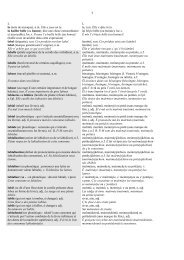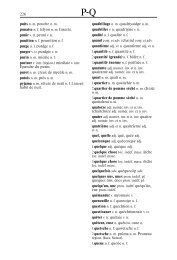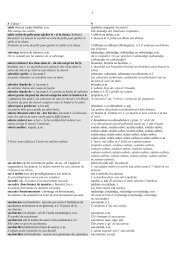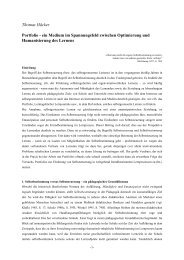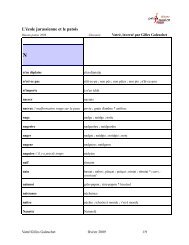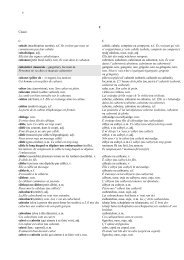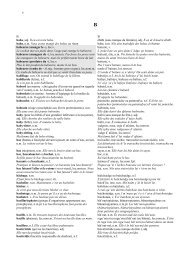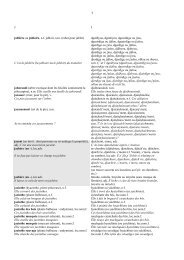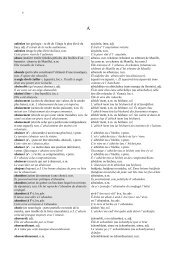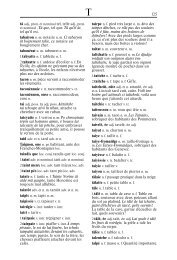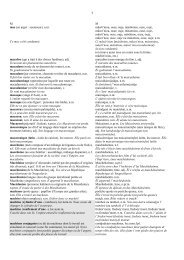R Classé ! R ra (onomatopée : coup de baguette ... - Image du Jura
R Classé ! R ra (onomatopée : coup de baguette ... - Image du Jura
R Classé ! R ra (onomatopée : coup de baguette ... - Image du Jura
You also want an ePaper? Increase the reach of your titles
YUMPU automatically turns print PDFs into web optimized ePapers that Google loves.
v.pron. Ceux qui ne se rét<strong>ra</strong>ctent jamais s’aiment plus<br />
que la vérité. (Joubert)<br />
rét<strong>ra</strong>cter (se - ; se cont<strong>ra</strong>cter, se retirer), v.pron.<br />
Les prolongements <strong>de</strong> l’amibe se rét<strong>ra</strong>ctent quand on<br />
les touche.<br />
rét<strong>ra</strong>cteur (qui a pour fonction <strong>de</strong> retirer, <strong>de</strong> tirer en<br />
arrière), adj. L’écailler <strong>coup</strong>e le muscle rét<strong>ra</strong>cteur <strong>du</strong><br />
pied <strong>de</strong> l’huître.<br />
rét<strong>ra</strong>cteur (en chirurgie : instrument servant à<br />
repousser les tissus ou certains organes), n.m. Le<br />
chirurgien <strong>de</strong>man<strong>de</strong> le rét<strong>ra</strong>cteur.<br />
rét<strong>ra</strong>ctibilité (en technologie : propriété d’une pièce<br />
<strong>de</strong> bois, d’effectuer un ret<strong>ra</strong>it, un gonflement), n.f. On<br />
s’attend à une rét<strong>ra</strong>ctibilité axiale <strong>de</strong> la pièce.<br />
rét<strong>ra</strong>ctible (qui peut rentrer, être rentré en <strong>de</strong>dans,<br />
rét<strong>ra</strong>ctile), adj. La foreuse est sur <strong>de</strong>s pieds<br />
rét<strong>ra</strong>ctibles.<br />
rét<strong>ra</strong>ctible (en technologie : qui a la possibilité<br />
d’effectuer un ret<strong>ra</strong>it), adj. Ce mortier est rét<strong>ra</strong>ctible.<br />
rét<strong>ra</strong>ctif (qui pro<strong>du</strong>it une rét<strong>ra</strong>ction), adj.<br />
Il faut compenser cette force rét<strong>ra</strong>ctive.<br />
rét<strong>ra</strong>ctile (que l’animal peut rentrer, retirer, en parlant<br />
<strong>de</strong>s ongles, <strong>de</strong>s griffes), adj. Le chat a <strong>de</strong>s griffes<br />
rét<strong>ra</strong>ctiles.<br />
rét<strong>ra</strong>ctile (susceptible <strong>de</strong> rét<strong>ra</strong>ction), adj.<br />
Cet animal a <strong>de</strong>s organes rét<strong>ra</strong>ctiles.<br />
rét<strong>ra</strong>ctilité (en sciences : propriété <strong>de</strong> ce qui est<br />
rét<strong>ra</strong>ctile), n.f. Elle observe une rét<strong>ra</strong>ctilité <strong>de</strong> la fibre.<br />
rét<strong>ra</strong>ction (acte par lequel certains organes se<br />
cont<strong>ra</strong>ctent et se déforment), n.f. Le froid est la cause<br />
d’une rét<strong>ra</strong>ction <strong>de</strong> la peau.<br />
rét<strong>ra</strong>ction (<strong>ra</strong>ccourcissement et rétrécissement que<br />
présentent certains tissus et organes), n.f. La<br />
cicatrisation ent<strong>ra</strong>îne une rét<strong>ra</strong>ction musculaire.<br />
ret<strong>ra</strong><strong>du</strong>ction (t<strong>ra</strong><strong>du</strong>ction d’un texte lui-même t<strong>ra</strong><strong>du</strong>it<br />
d’une autre langue), n.f.<br />
Il en a donné une ret<strong>ra</strong><strong>du</strong>ction.<br />
ret<strong>ra</strong><strong>du</strong>ire (t<strong>ra</strong><strong>du</strong>ire <strong>de</strong> nouveau ; t<strong>ra</strong><strong>du</strong>ire un texte qui<br />
est lui-même une t<strong>ra</strong><strong>du</strong>ction), v.<br />
Il voud<strong>ra</strong>it ret<strong>ra</strong><strong>du</strong>ire ce texte.<br />
ret<strong>ra</strong>itant (personne qui fait une ret<strong>ra</strong>ite religieuse),<br />
n.m. Chaque soir, les ret<strong>ra</strong>itants allaient à l’église.<br />
ret<strong>ra</strong>it (en hé<strong>ra</strong>ldique : se dit <strong>de</strong>s ban<strong>de</strong>s, barres,<br />
chefs, pals, etc. qui sont <strong>ra</strong>ccourcis), adj. Une ban<strong>de</strong><br />
sur <strong>de</strong>ux est ret<strong>ra</strong>ite.<br />
ret<strong>ra</strong>it (en agriculture : dont les g<strong>ra</strong>ins ont mûri en se<br />
recroquevillant), adj. Ce blé est ret<strong>ra</strong>it.<br />
ret<strong>ra</strong>it (le fait <strong>de</strong> se retirer, pour une chose), n.m.<br />
Ils atten<strong>de</strong>nt le ret<strong>ra</strong>it <strong>de</strong> l’eau.<br />
ret<strong>ra</strong>it (le fait <strong>de</strong> se retirer, pour <strong>de</strong>s personnes), n.m.<br />
Le ret<strong>ra</strong>it <strong>de</strong>s troupes d’occupation commence.<br />
ret<strong>ra</strong>it (lieu où l’on se retire, se réfugie), n.m.<br />
Il ne quitte jamais son ret<strong>ra</strong>it.<br />
ret<strong>ra</strong>it (le fait pour un corps, <strong>de</strong> se retirer en se<br />
resser<strong>ra</strong>nt, en se cont<strong>ra</strong>ctant), n.m. Ce ret<strong>ra</strong>it <strong>du</strong> béton<br />
Ces qu’ se ne r’dénég<strong>ra</strong>nt dj’mais s’ ainmant pus qu’ lai vartè.<br />
se r’dénég<strong>ra</strong>ie, v.pron.<br />
Les prolondg’ments d’ l’ aimibe se r’dénég<strong>ra</strong>nt tiaind qu’ an les<br />
toutche.<br />
82<br />
r’dénégrou, ouse, ouje, adj.<br />
L’ échâlou cope le r’dénégrou niè di pie d’ l’ heûtre.<br />
r’dénégrou, n.m.<br />
L’ chirudgien d’main<strong>de</strong> le r’dénégrou.<br />
r’dénégribyetè, n.f.<br />
An s’ aittend en ènne éssuâ r’dénégribyetè d’ lai piece.<br />
r’dénégribye (sans marque <strong>du</strong> fém.), adj.<br />
Lai boéy’nouje ât chus <strong>de</strong>s r’dénégribyes pies.<br />
r’dénégribye (sans marque <strong>du</strong> fém.), adj.<br />
Ci moétchie ât r’dénégribye.<br />
r’dénégrifye (sans marque <strong>du</strong> fém.), adj.<br />
È fât compeinchie ç’te r’dénégrifye foûeche.<br />
r’dénégriye (sans marque <strong>du</strong> fém.), adj.<br />
L’ tchait é <strong>de</strong>s r’dénégriyes grèppes.<br />
r’dénégriye (sans marque <strong>du</strong> fém.), adj.<br />
Ç’te béte é <strong>de</strong>s r’dénégriyes l’ ouerganons.<br />
r’dénégriy’tè, n.f.<br />
Èlle prégime ènne r’dénégriy’tè d’ lai bridje.<br />
r’dénég<strong>ra</strong>icchion, v.<br />
L’ f<strong>ra</strong>id ât lai câse d’ lai r’dénég<strong>ra</strong>icchion d’ lai pé.<br />
r’dénég<strong>ra</strong>icchion, v.<br />
Lai tçheûti<strong>ra</strong>ince engârie ènne muchquâ r’dénég<strong>ra</strong>icchion.<br />
eur’trâ<strong>du</strong>chon, eur’t<strong>ra</strong><strong>du</strong>chon, eurtrâ<strong>du</strong>chon, eurt<strong>ra</strong><strong>du</strong>chon,<br />
r’trâ<strong>du</strong>chon, r’t<strong>ra</strong><strong>du</strong>chon, rtrâ<strong>du</strong>chon ou rt<strong>ra</strong><strong>du</strong>chon, n.f.<br />
Èl en é bèyie ènne eur’trâ<strong>du</strong>chon (eur’t<strong>ra</strong><strong>du</strong>chon, eurtrâ<strong>du</strong>chon,<br />
eurt<strong>ra</strong><strong>du</strong>chon, r’trâ<strong>du</strong>chon, r’t<strong>ra</strong><strong>du</strong>chon, rtrâ<strong>du</strong>chon ou<br />
rt<strong>ra</strong><strong>du</strong>chon).<br />
eur’trâ<strong>du</strong>re, eur’t<strong>ra</strong><strong>du</strong>re, eurtrâ<strong>du</strong>re, eurt<strong>ra</strong><strong>du</strong>re, r’trâ<strong>du</strong>re,<br />
r’t<strong>ra</strong><strong>du</strong>re, rtrâ<strong>du</strong>re ou rt<strong>ra</strong><strong>du</strong>re, v.<br />
È voé<strong>ra</strong>it eur’trâ<strong>du</strong>re (eur’t<strong>ra</strong><strong>du</strong>re, eurtrâ<strong>du</strong>re, eurt<strong>ra</strong><strong>du</strong>re,<br />
r’trâ<strong>du</strong>re, r’t<strong>ra</strong><strong>du</strong>re, rtrâ<strong>du</strong>re ou rt<strong>ra</strong><strong>du</strong>re) ci tèchte.<br />
eur’trétaint, ainne, eurtrétaint, ainne, r’trétaint, ainne ou rtrétaint,<br />
ainne, n.m. Tchétçhe soi, les eur’trétaints (eurtrétaints,<br />
r’trétaints ou rtrétaints) allïnt â môtie.<br />
eur’trèt, e, eurtrèt, e, r’trèt, e ou rtrèt, e, adj.<br />
Ènne bain<strong>de</strong> chus doûes ât eur’trète (eurtrète, r’trète ou rtrète).<br />
eur’trèt, e, eurtrèt, e, r’trèt, e ou rtrèt, e, adj.<br />
Ci biè ât eur’trèt (eurtrèt, r’trèt ou rtrèt).<br />
eur’trèt, eurtrèt, r’trèt ou rtrèt, n.m.<br />
Èls aittendant l’ eur’trèt (l’ eurtrèt, le r’trèt ou le rtrèt) d’ l’ âve.<br />
eur’trèt, eurtrèt, r’trèt ou rtrèt, n.m.<br />
L’ eur’trèt (L’ eurtrèt, Le r’trèt ou Le rtrèt) <strong>de</strong>s treupes<br />
d’ otiupâchion èc’mence.<br />
eur’trèt, eurtrèt, r’trèt ou rtrèt, n.m.<br />
È n’ tçhitte dj’mais son eur’trèt (eurtrèt, r’trèt ou rtrèt).<br />
eur’trèt, eurtrèt, r’trèt ou rtrèt, n.m.<br />
Ç’t’ eur’trèt (Ç’t’ eurtrèt, Ci r’trèt ou Ci rtrèt) di bètun ât normâ..



